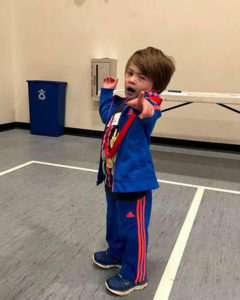By Renee Plant, Contributing Writer

Photo/submitted
Marlborough – Special Olympics Massachusetts will run its Young Athletes program beginning Oct. 10 at the Yawkey Sports Training Center. The free program is designed as an early introduction to sports and the world of Special Olympics. Children from ages 2 to 7, with and without intellectual disabilities, can participate in the six-week session to learn new skills while playing together in a unified environment.
Eric Archambault, programs operations manager of Special Olympics Massachusetts, said the program’s mission is to create unity among young athletes.
“We want to promote inclusive environments at a young age,” he said. “Participating in these programs fosters an inclusive environment, which prevents kids with disabilities from being on the sidelines as they grow up. The unified piece is huge because this enables kids to start school without there being a divide between individuals with and without disabilities.”
The program introduces children to skills they will need when joining community athletic programs down the road. Archambault said Young Athletes focuses on a different skill area each week, beginning first with foundational skills like body awareness and coordination, then moving onto more targeted activities such as throwing and kicking balls.
“A lot of the activities are modified to individual’s activity levels and ages,” he said. “This helps to foster success when they participate, and also helps them to make strides.”
Ultimately, Archambault said organizers would like to implement two phases of the program, dividing athletes only by their age.
“This would give older kids the opportunity to build and develop in sports,” he said. “Some aren’t ready to jump into community programs [at age 8], and need to take things at a slower speed.”
Margot Slowick’s 5-year-old son, Gabe, is an athlete participating in a program. Slowick said Gabe looks forward to going to the “big gym” each week, and that she is grateful for the interactive experience afforded to him through Young Athletes.
“The sessions were great opportunities for [him] to have the chance to strengthen and develop his gross motor skills, while also expanding his social skills through interactions with the other participants and volunteer staff,” she said. “If the child is comfortable, parents are encouraged to sit on the bleachers and let the kids participate on their own with the volunteer staff. This is a great opportunity for building independence and also learning how to share, take turns and follow directions in a new setting.”
Meredith Lively, whose son Joey has been an athlete in the program for two years, said program organizers have played a large role in his overall success since he began.
“The program offers [him] both guided and independent opportunities to develop his social skills and good sportsmanship,” she said. “This program has changed Joey, who had been diagnosed with autism. He is now more independent [and outgoing].”
According to Archambault, it’s not just the athletes who are benefiting from the program. He said it has also allowed parents, whose children are making friends through Young Athletes, to find common ground.
“We see parents chatting on the bleachers and exchanging phone numbers,” he said. “Playdates are being arranged as a result of children meeting through the program. This reflects our goal of creating an inclusive environment that ultimately means making friends and welcoming everyone on an equal playing field.”











